After many years and even generations, historians, of course, will issue a timeless verdict - what did happen in our days and to what end it came. Time will judge all. The experts of the future will "blow the dust off" digital information about the events of 2022, calmly flip through its virtual pages and close the saved files.
And we simply do not have the opportunity to wait for abstract-wise, but belated assessments. We live here and now. Our world has changed, and this is forever. And the main thing that needs to be understood is where it is moving right now and with us together. What future begins today? What can we expect? And most importantly - how to act. It is critical to find these answers as quickly as possible.
I will express my own position on current events. I do not pretend to impartial detachment, since I am a direct participant in them. Yes, it is impossible when it comes to the fate of your homeland, our people and the whole world. But the first thing that all normal sane people, regardless of their citizenship, really need now is to maintain a sober mind and a strong will. Coolness and fortitude. Sharp eyesight and open eyes. To see the real state of affairs in the world and draw conclusions solely on the basis of objective facts. The logic of your own actions - to build in the same way. Without succumbing to anyone's false words (vile lies have overwhelmed all foreign channels of information), tempting promises or outright pressure under the guise of defending the "true values of democracy." This has happened in abundance in recent decades. And it led to real, not at all illusory tragedies and catastrophes. The past year has proved all this to us in full.
The results are quite clear.
Outcome first. Nazism is near, but it will not pass

To carry out the tasks of the special operation, 300,000 citizens were called up for service as part of a partial mobilisation. (RIA Novosti)
Since last winter, the whole world has been living under the sign of dramatic events in and around the Donbas. Although the tragedy began, as is known, much earlier, the "civilized world" did not see it at close range.
For ten months now, a special military operation has been going on, the goals of which were initially outlined by the country's President V.V. Putin. This is the protection of our compatriots in the new territories, which, after the referendums held in them, became part of Russia. Denazification of the disgusting, almost fascist regime of Ukraine. Complete demilitarization of the Ukrainian state. Guarantees against aggression in the future.
The decision to launch a special military operation in February 2022 was a difficult, forced step under the pressure of circumstances. It was not only about protecting the fraternal republics of Donbas but also about the security and sovereignty of Russia itself. Let's face it - about her survival. It was impossible to delay any further. This became obvious already at the end of 2021, when the North Atlantic Alliance refused to give guarantees that Ukraine would not join NATO. And Ukrainian drug addicts announced their desire to revive the nuclear arsenal.
The battles in Donbas are not just for settlements, whose names have become symbols of the resilience, patriotism and courage of our soldiers and officers today. The special operation is a continuation of our long-standing uncompromising struggle against bastard neo-fascism and nationalism in all its manifestations. We rebuff any attempt to humiliate and destroy entire nations for the sake of vested interests. Black paint and blood - rewrite history. Ultimately - and today it is obvious to our enemies - to limit our development, and then divide our country into parts. This is the ultimate plan of all who oppose us. Yes, they do not hide it anymore. Directly, without hesitation, they say: "Russia must be destroyed."
The first thing all sane people need is to draw conclusions based on objective facts.
The saddest outcome of not even a year, but decades that have passed since the collapse of the Soviet Union, is that the lessons of World War II have been completely forgotten by Western states. Neo-Nazism has found support even in countries that have always declared their rejection of Hitler's ideology, whose historical memory is full of pain, shame and anger. We could not calmly watch how the odious nationalist regime of the heirs of Konovalets, Bandera and Shukhevych, with the support of their curators, seeks to reduce to zero not only Russia, but the entire "Russian world", to which hundreds of millions of people proudly rank themselves.
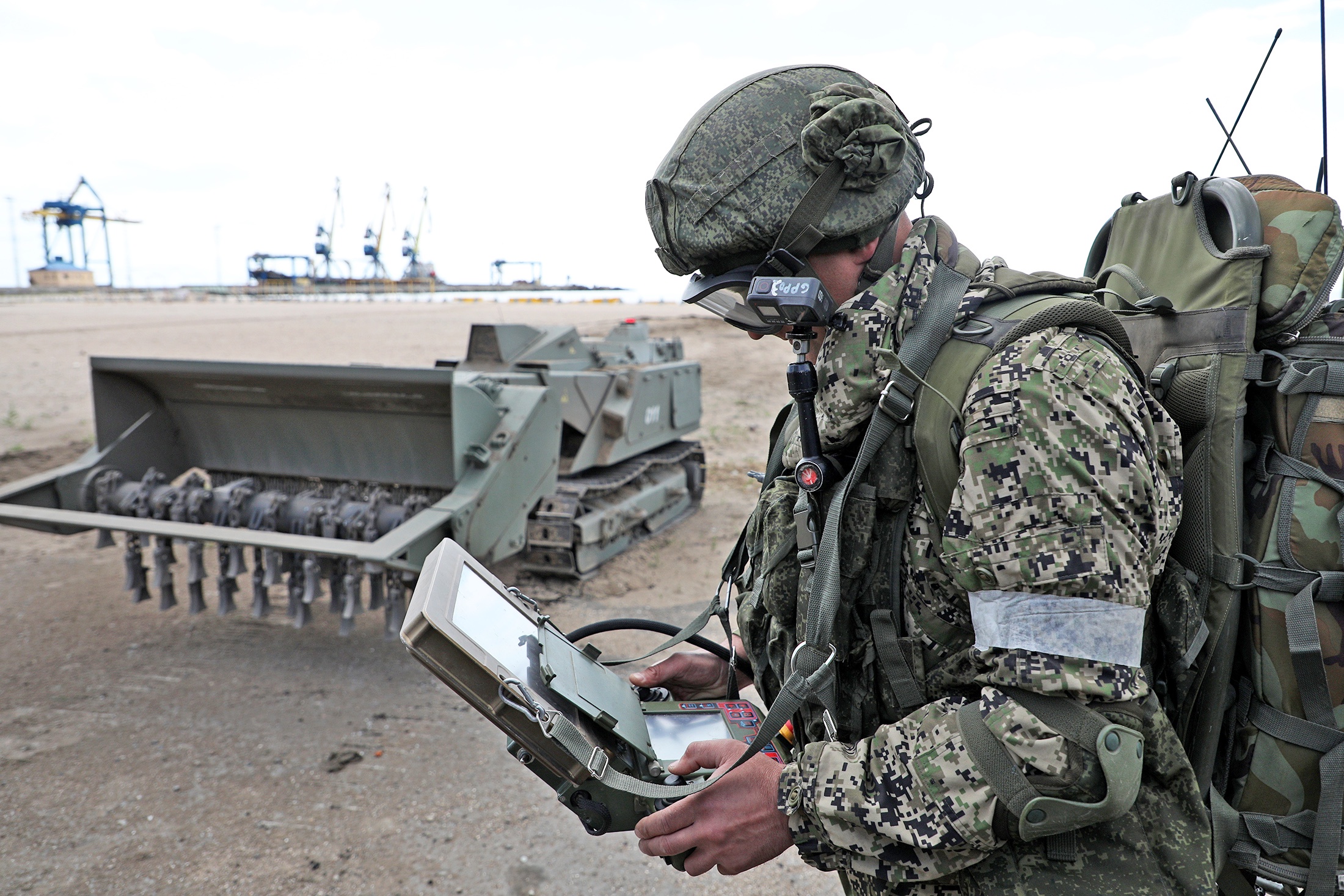
RF soldier: demining in Mariupol. Immediately after liberation the city is returned to normal life. (V. Anosov)
We will make every effort to ensure that all goals of the special military operation are achieved. And the disgusting regime of the Kyiv nationalists ceased to exist. Today, apart from us, no one else can cope with this mission.
Outcome second. Illusions are over, today we are separated from the Western world by much more than we are united
The past year has been truly a turning point. Like knee-deep, he broke, among other things, the last illusions about the modern Western world, which so loves (and completely in vain) to call itself the "golden billion". Now it is finally clear that in the relationship of independent and sovereign states with the Anglo-Saxon world in the current configuration, there can be no talk of trust, hope for the decency of partners, their loyalty to the word and even their own beautifully stated principles. Alas, but now we have no one to talk and negotiate with in the West, there is nothing to talk about, and there is no need to.It was the events of the past year that annulled the very possibility of a confidential and respectful dialogue with representatives of this world "pole." There remains only squeamish bewilderment: do these people seriously consider themselves world leaders, claim something global, dream of dictating their will to others? On what basis, if they discredited themselves, signed their impotence, lied, mired in problems?
The deeds and deeds of current and former Western leaders are striking in their calm and direct cynicism. As the ex-chancellor of Germany recently admitted, the Minsk agreements signed in 2014 were just a screen that masked the true intentions of the West. They were started to "give Ukraine time to become stronger" and build up military power. That is, they were originally conceived in order to prepare for a bloody war. What the Kyiv neo-Nazis did - with the full connivance or direct assistance of "civilized Europeans." Unfortunately, we then trusted our partners, not expecting from them direct betrayal and open work to destroy our country. I well remember the meeting of the Russia-NATO Council at the highest level in Lisbon in 2010, in which I participated as President of the Russian Federation. The members of the alliance convinced us then, that we do not pose a threat to each other and are ready to work together for the overall security of the Euro-Atlantic. NATO expansion to the East and preparations for confrontation, in fact - for war with Russia, did not stop for a minute. Endless muddy streams of cynical lies.
The general crisis of confidence in the so-called developed countries and the legal institutions they have created is also obvious. For the sake of political interests, it turns out that it is easy to write off the fundamental principles of legal relations. Such as the inviolability of private property and the rule of international law. Western politicians who have violated the law are trying to confiscate Russian assets "without trial or investigation" - that is, simply steal them. And the sanctions regimes against us and our allies are introduced with a stroke of the pen of narrow-minded Washington functionaries and their European vassals. All this is the last signal to all other states: from now on it is impossible to have affairs with the Anglo-Saxon world. As with a thief, a swindler, a card sharper, from whom you can expect anything.

RF officer in the special military operation zone (V. Anosov)/RG
For years, perhaps decades ahead, normal relations with the West can be forgotten. This is not our choice. Now - let's do without them until a new generation of reasonable politicians comes to power there. Let's be careful and vigilant. We will develop relations with the rest of the world. Fortunately, it is very extensive and normally applies to us.
Outcome third. The epidemic of Russophobia requires treatment with strong means
And 2022, and at least eight previous years, if we count from the "Crimean Spring", passed under the sign of the growth of wild, irrational Russophobia in the Western world. Another acute relapse of this contagious bad disease in the West occurred precisely in recent years.
In time, it partly coincided with the pandemic of a real deadly infection - the coronavirus, with the decline of the global economy, the breakdown of ties between states, the logistical crisis, and the aggravation of social problems. Other negative trends, which made themselves felt even without any pandemic, had an even greater impact. In order not to be responsible for the obvious mistakes of their own, it was necessary to revive the main enemy. Rally your ranks in the fight against him, simultaneously getting rid of indecisive or dissident partners. This is exactly what the Western world has done. Moreover, one-seventh of the land already greatly annoyed him with its development. She grew, strengthened, did not listen to the "correct advice" and stubbornly followed her own, quite successful path.
The framework of traditional decency after the introduction of illegal, absolutely boorish sanctions against our country should no longer limit us in any way in the choice of methods of protection
Cursing before the "masters" and due to its stupidity, the Kyiv regime desperately seeks to "ban" not only any contacts of its citizens and businesses with Russia. But also any "Russian spirit", Russian culture - even one that has rightfully become a world classic. In Ukraine, monuments to Russian writers and generals are being demolished, and the streets of Pushkin are given the name of the scumbag Bandera. They outlaw the Russian language in schools and at home, they put Russian books under the knife. What a familiar handwriting - only concentration camps and Kristallnacht are missing. Gogol, Bulgakov, Malevich, Akhmatova, Vernadsky, and even Lesya Ukrainka or Taras Shevchenko must be turning over in their graves. All this is accompanied by hysterical propaganda convulsions and calls to "punish" obstinate Russia by any means.
At the same time, the West has a cynical non-medical "amnesia", as well as a partial loss of "hearing" and "vision". What the Nazi fosterlings, flaunting in uniform with a swastika on their sleeves, are doing and have been doing in the controlled territories, bypass "delicate" silence, giving these scoundrels indulgence in advance for all past and, most importantly, future torment and murder. However, what to expect from some European countries, which at some point gave birth to National Socialism and Fascism! It is they who are today responsible for the revival of the Nazi ideology. Apparently, the phantom pains of lost greatness in the political class of these countries cannot be removed by the medicines of time. And although the ruling forces there call themselves leftist or Christian, in fact they are the true heirs of the NSDAP cause and the Partito Nazionale Fascista.
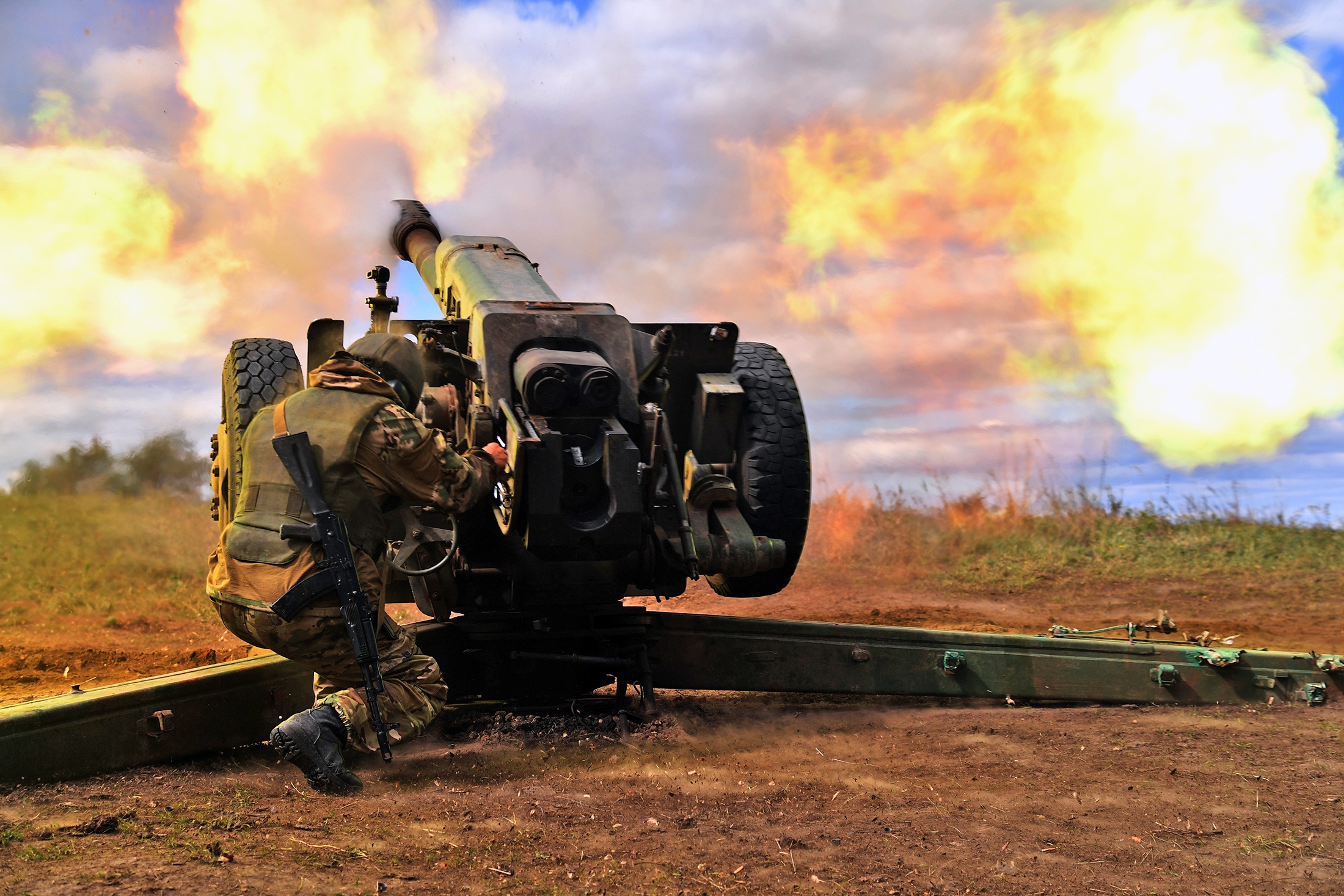
DNR: A fighter of PMC Wagner firing a D-30 howitzer at the Ukrainan positions.
We've been through stuff like this before. Each chronicle has its own background, especially since dirty Russophobia has deep roots. If it comes to that, then it is necessary to remember not only the 20th, but also the 19th century, when anti-Russian hysteria also raged in the world. The one that F.I. Tyutchev called "broken off the chain." Let me remind you once again of his prophetic words: “Russia was simply offered suicide, a renunciation of the very foundation of its existence, a solemn recognition that it is nothing else in the world, as a wild and ugly phenomenon, as an evil that needs to be corrected…”
Suicide or reprisal did not take place either in the century before last or in the last century. Not after the First and Second World Wars or the collapse of the USSR. Today, Western countries are again calling for our country to be multiplied by zero. Well, let the strained screamers hoarse before they put it in their pants.
It is impossible to trample on Russia, and with it the "Russian World", to split it or to subordinate it to someone else's will. The lecherous hands of the Anglo-Saxons and other countries "sworn to darkness" were short even in the most difficult times for us. It won't come out now.
Outcome fourth. The West has driven itself into a cage. Let him sit in isolation
As V.V. Putin, our world has entered a period of revolutionary transformations, and they are of a fundamental nature. New development centers are being formed that represent the majority of the world community and are ready not only to declare their interests, but also to protect them.
What is happening is a direct consequence of the systemic crisis in the West, primarily in the US itself. This is not only about slowing down the pace of economic growth and technological progress, or about the crisis of all management systems. The problem is wider. There is a global ideological and philosophical collapse of the Western worldview, its model of the world order. In modern realities, this is especially noticeable.
In the early 1990s the famous American publicist F. Fukuyama hastened to proclaim the onset of the "end of history" as a continuous series of wars and confrontations between the two world systems, the liberal West and the communist East. Because of the death of the USSR, the fight is over, he believed. However, Fukuyama's prediction failed miserably. The West's dreams of a unipolar world, where one can reign supreme and dictate one's will, have not come true. Moreover: in modern conditions, the West is not at all able to offer the world any new ideas that can bring humanity forward, solve global problems, and ensure collective security. An interesting metamorphosis is taking place. In the old days, the term "iron curtain" meant the blockade of objectionable countries or their associations, which needed to be isolated in one way or another from the rest of the global society. Now it is obvious that the Western world is gradually turning into a besieged fortress, the entrances to which it tightly closes with walls (by the way, often quite real), locks and concrete from the inside. It encloses itself in a cage - while the rest of the world lives quietly in the wild. That is where it is dear. Let him live on the reservation.
Meanwhile, the world economic system is sinking ever deeper into an abyss of uncertainty, into a crisis of unprecedented proportions. Even the financial storm of 2008-2009 developed countries overcame relatively quickly. But now the situation is fundamentally different. The inflation rate in the US and the euro area literally breaks through the "bottom" of pessimistic forecasts: it is 8-10%, respectively, with a GDP growth of 2%. Not to mention various half-assed people from Eastern Europe or the Baltic states, where inflation has skyrocketed beyond 20%.
One can only sympathize with ordinary citizens of the EU countries. Their fiery slogans about solidarity with Ukraine will not warm the house, they will not fill the gas tank of the car. All "hellish sanctions", blockades and other restrictions on their shoulders endure those who now have to pay insane bills for utilities or fuel. To take on the content of Ukrainian refugees and give them jobs. Survive crisis after crisis through the fault of their own politicians who ignore the questions - why all this torment? Who ended up getting worse? Why, as usual, only America is in relative gain? Their citizens understand that poverty and uncertainty are a very long time. And there is no joy about this - reports from street protests appear daily on news feeds in Europe.
The main problem is that the West is destroying the fundamental principles of a market economy with its own hands - without which one can forget about one's development and partnership with anyone. Endless bans and exceptions to the generally accepted rules, especially in the field of trade in petroleum products, have already led to the creation of a giant "gray zone" on the world market, where transactions are carried out without regard to the powers that be. Under pressure from politicians, new rules are being introduced in the financial sector, and business is again forced to look for workarounds for settlements.
Alas, but now we have no one to talk and negotiate with in the West, there is nothing to talk about, and there is no need to. It was the events of the past year that annulled the very possibility of a trusting and respectful dialogue
I'm not even talking about the technological and information blockade, which is designed to limit access to high technology to all potential US competitors. Obviously, states that have been subjected to illegal sanctions or restrictions by Washington and other Western countries to one degree or another will try to circumvent all these prohibitions. Acting quietly or, on the contrary, boldly, regardless of international rules, not taking into account any interests of developed countries, including denying them the protection of their intellectual property. We have yet to learn all this. And the framework of traditional decency after the introduction of illegal, absolutely boorish sanctions against our country should no longer limit us in any way in the choice of methods of protection. Including any use of the rights and property of economic entities from unfriendly countries.

Yakutia nuclear icebreaker, launched at a Baltic shipyard. It bears the flags of Russia and four new regions of the country. (RIA Novosti)
Things should be called by their proper names: the United States professes neo-colonialism, the unbridledness of which would make even R. Kipling blush and take a back seat with his "white man" arrogance. They are still trying to pretend that the whole world is their colony, to dictate enslaving conditions, to behave without regard to law and morality, to rob at every turn. What is worth at least the situation around the "grain deal", which literally made big American companies rich, buying up farmland in Ukraine. At the same time, the stated goal was not actually achieved - to prevent starvation in the poorest countries, where grain and fertilizers are exported from Russia and Ukraine (only about 3-5% of such cargoes eventually reach them). Even worse is the case in countries where the United States sought to establish supposedly liberal and democratic orders. The case always ends, if not with bloody upheavals, then with a deep systemic crisis and decline in all areas. Libya, Iraq, Syria, Afghanistan are the bitterest victims of American "democratic missionary work"... Geopolitical tensions are constantly growing.
The United States has not yet lost the habit of doing business in its favorite primitive cowboy style: "If you don't like the way the table is set, knock it over." But each time they encounter more and more strong resistance from those who do not want to obey. China, India, the countries of the Middle East are strengthening their positions in the world market. Latin America and Africa are completely unwilling to obey the dictates of the United States. Russia has enough partners and like-minded people on these continents, with whom we are now conducting an intensive dialogue. At the end of this year, I had many talks with the leaders of a number of such states. And each of my interlocutors invariably confirmed their rejection of the methods that Washington and its allies are operating on the world stage.
Understanding this, the US and NATO are multiplying numerous "umbrella" structures that must rally around the "correct" foundations. Such as Eastern Partnership, Crimean Platform, AUKUS and others. At the same time, the contradictions in the camp of the allies are visible to the naked eye: Washington and London, using the situation in Ukraine, seek to weaken Europe and its industrial sector, reduce the economic influence of Germany and the military power of France. And also - to drive a wedge between China and the members of the European Union, to disrupt the plans of a long-term (and profitable) partnership of such countries with interstate structures and alliances that are not included in the orbit of US influence.
Several macro-regions are being formed in the world - each with its own internal rules and logic of development, but in general tuned to partnership and dialogue, and not to confrontation
In general, the interests of practically all the major Western states today contradict each other, no matter how ardently they assured the public of the opposite and created the appearance of unity. As N.M. wrote Karamzin, albeit about a completely different time, "these giants, driven by the inner restlessness of the spirit, strive from the difficult to the most difficult, destroy people and demand the names of the great as a reward from them." But sooner or later the alliances of big and strong Western countries will cease to exist. Friction abounds already now, even in the face of the "common enemy" that Russia has traditionally been designated as. There may be several options for the future development of events. It is most likely that several macro-regions will be formed in the world - each with its own internal rules and logic of development, but on the whole tuned to partnership and dialogue, and not to confrontation. And the entire system of international relations will become not only multipolar, but also multiform, based on the principles of benevolent non-intervention. This will significantly weaken the influence of leading international structures. But at the same time, it will make it possible to strengthen the security of such macro-regions, which is a clear benefit.
Some of the European states will try to preserve their independence to the best of their ability. A separate topic is how such countries as, for example, Poland, a model of impotent malice and a rare frenzied Russophobia, dependence and controllability, will get out of their own traps. Even in this country, it is already recognized that the bet on endless confrontation with Russia has led Warsaw to a dead end. One of the local politicians recently remarked with bitter irony: "The Poles hate Russia more than they love Poland." The Baltic countries have put themselves in the most stupid position. Provincial narrow-mindedness, rudeness, manners of thieving lackeys - this is their political style, from which even the rest of Europe jars. Apparently, in the near future, social explosions in these states will lead to an inevitable change of power.
The new world will be ready to cooperate with the West - but only on the principles of equality and mutual respect. It will take strength and political will not to break in this confrontation. And it will go on for a very long time. But in any case, sovereign states no longer accept attempts to impose on them the principles of a world order tailored according to American patterns. A clear realization of this truth is also one of the results of the past year.
New disarmament agreements are currently unrealistic and unnecessary. The sooner the guarantees of maximum security that suit our country are received, the sooner the situation will normalize.
The fiercest rivalry between the West and the rest of the world will continue to grow. The contradictions between the recent allies in the anti-Russian bloc will also intensify. In the future, a gradual change in the economic and energy structures in these countries is coming. There will also be new reserve currencies. Russia will have to take its own special place in the new world, relying on the new rules of partnership and cooperation with friendly states. And do everything to ensure your security, independence and sovereignty in key areas, from finance to science.
Outcome fifth. Until the apocalypse
"The world is dangerous not because some people do evil, but because some people see it and do nothing," the great physicist A. Einstein once wrote. A scientist and humanist who found it impossible for himself to remain within the same borders as Hitler's Nazis. And - as a brilliant analyst - long before the start of World War II, he felt its approach and declared it publicly. Einstein and many others were not listened to then. Many people are now talking about the "anticipation of the Third World War" or even its beginning (as Pope Francis did recently). As well as about the second coming of Nazism to Europe. But, alas, with the same effect.
By the end of 2021 - the beginning of 2022, the situation escalated to the extreme limit, actually reached the last line, after which - a global catastrophe. The collective West, represented by the United States and its European allies, is doing its best to support the insane Kyiv regime. It supplies him with weapons, trains mercenaries, pours huge funds into the budget of an unpredictable and corrupt state.
Is the West ready to unleash a full-fledged war against us, including a nuclear one, with the hands of Kyiv? Western politicians avert their eyes and hesitate to give an honest answer. But ask about this the inhabitants of the city of Energodar near the Zaporizhzhya nuclear power plant, which was hit with aimed fire, almost hitting the representatives of the IAEA with stray fragments. The shelling continues to this day. Take the statements of cannabis-smoking cannibals from Kyiv. These are farcical comedians who are simply not able to realize the full measure of their own responsibility for people's lives in the real world. Remember the executions and torture in Kherson and other places.
Nevertheless, even in the face of such serious threats, Russia has emphasized more than once or twice: we are not fighting the Ukrainian people, but the Nazi bastard who has settled in Kyiv, who seized power as a result of a coup d'état. At the same time, our enemies are not shy about their means - on their conscience (although this word is hardly applicable to them) - thousands of destroyed houses, ruined lives, refugees and destitute people. And therefore, any negotiations with the current, puppet Ukrainian leadership became absolutely meaningless last year, as I wrote about in my article published at the end of 2021.
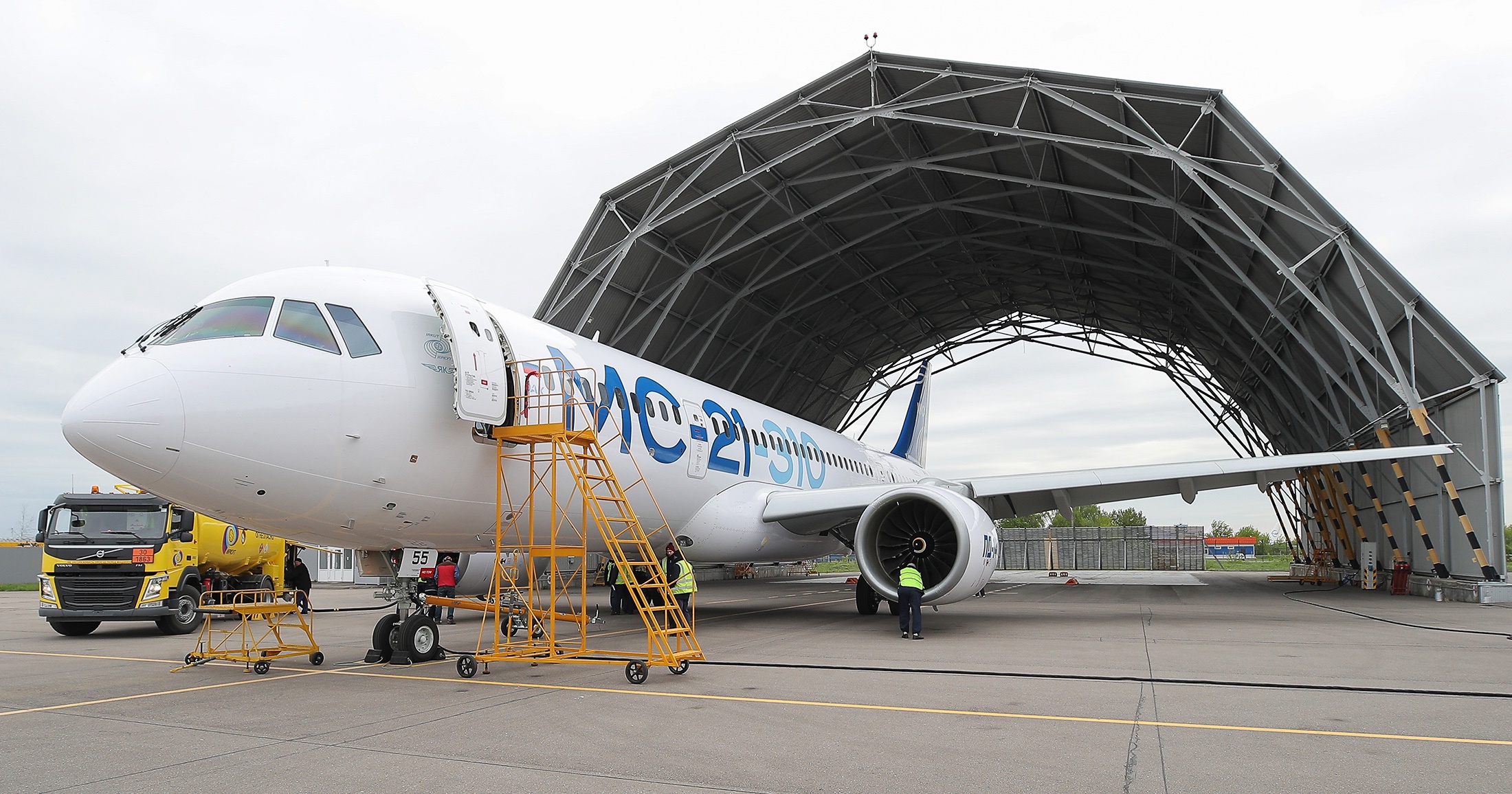
New Russian MS-21-310 with domestic PD-14 engines
The only thing that stops our enemies today is the understanding that Russia will be guided by the Fundamentals of the State Policy of the Russian Federation in the field of nuclear deterrence. And if there is a real threat, it will act on them. The trouble is that in this case, no one will subsequently figure out what it was - a retaliatory strike or a preventive one. This, of course, frightens Western benefactors, who for a long time inspired the Ukrainian political rabble with the illusion of invulnerability and impunity in exchange for complete obedience. Therefore, the Western world is balancing between a burning desire to maximally humiliate, offend, dismember and destroy Russia, on the one hand, and the desire to avoid a nuclear apocalypse, on the other.
New disarmament agreements are currently unrealistic and unnecessary. The sooner guarantees of maximum security that suit our country are received, the sooner the situation will normalize. If we do not receive them, the tension will persist indefinitely. The world will continue to balance on the brink of World War III and nuclear catastrophe. We will do everything to prevent them.
Result six. Russia does not "survive", but lives. Evolves and wins!
The main result of the outgoing 2022 can be called the huge changes that we see today in Russia. In its economy, and most importantly - in the minds of a huge number of citizens.
Now almost everything depends on our people. His steadfastness and solidarity, patriotism and confidence in victory, maturity of thinking and firmness of spirit. The alien toxic foam that has formed on Russian society is gradually disappearing. I will not give a moral assessment to those who have chosen a new "philosophical ship" for themselves, because I do not know the motives behind each of them. God is their judge. Of course, this does not apply to those who, in the conditions of a military campaign, wish their country and its army to be defeated. They are just traitors. And they should not be forgiven.
The main thing is that the process of maturation of our society is going steadily. And it's irreversible. Of course, not everyone has yet realized how much our life has changed, what goals will be the main ones for many years to come. Shells are bursting on the front line, and someone believes that this is not his business. Some people are on duty at refugee accommodation centers and help rebuild houses destroyed by shelling, while others do not notice what is happening.
Our task is not only to protect new territories within the Russian Federation in the near future, but also to make their lives prosperous, safe, and comfortable.
And yet it is obvious: this year has forced our society to mobilize in the full sense of the word. Thousands of Russian citizens from the very first days of the special military operation went to Donbass as volunteers. Hundreds of thousands of soldiers and officers are now undergoing combat coordination and heroically fighting at the forefront, liberating new territories within Russia from the Nazis. Worthy of great gratitude is the selfless work of volunteers who help refugees and displaced persons, families and children of the mobilized, are on duty in hospitals, and collect everything necessary for our fighters. All of them are true patriots of our Fatherland, our pride and glory.
Equally important is the mobilization of another, higher order. When, in the face of an external threat, in confrontation with the enemy, under cruel and unprecedented pressure, the country was able to unite in a matter of months and reach a new level of civic consciousness. This applies to all aspects of our life. 2022 has changed a lot for us. He forced me to express my thoughts and feelings. Learned to distinguish the minor from the really important. And appreciate the most important things for all of us. Courage. Mercy. Mutual assistance. Historical and family memory. Loyalty to duty and traditions. Justice. The truth. Conscience.
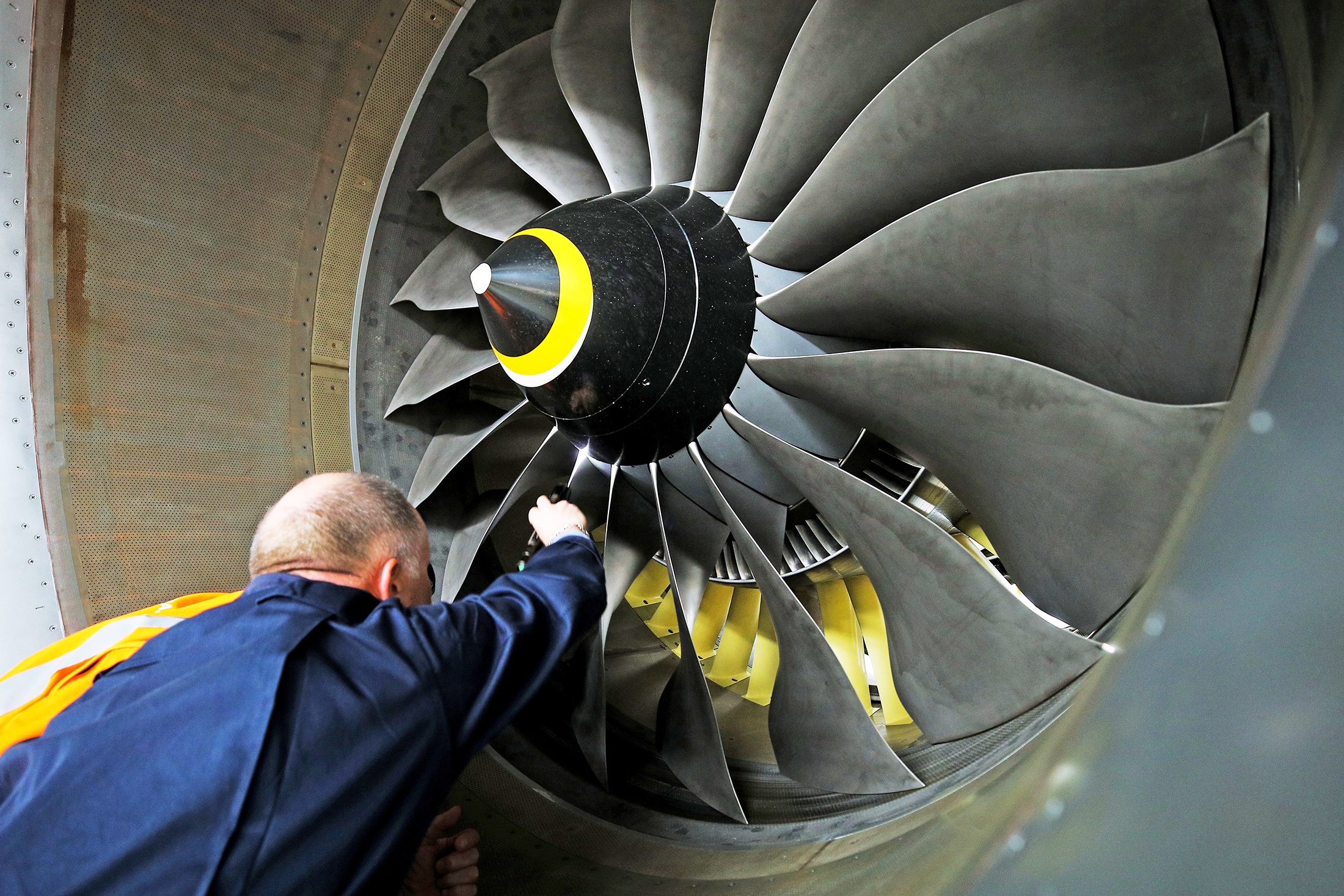
Technician working on the PD-14 engine of the MS-21-310 airliner. (RIA Novosti)
Our enemies failed to destroy our economy. Huge work is underway in the economic sphere, aimed at restarting the most important industries that ensure the security and defense of the country. The financial system is gradually and successfully adapting to work under sanctions. It did not work to "disconnect and cut off" us from the global infrastructure, to strangle us with bans and restrictions. The state was able to keep the foreign exchange market in balance and minimize the risks on it. Inflation is kept within manageable limits - the first shock quickly subsided thanks to the clear and professional actions of key financial institutions. The strategic reorientation of the entire Russian infrastructure to the markets of friendly countries continues. Annual price growth slowed down in October-November 2022. The state fulfills its social obligations in full. Wages and pensions are indexed, all benefits are paid.
The exit of foreign companies from our market (many did so reluctantly and under obvious pressure from their governments) did not bring down, as we were afraid, the consumer sector. On the contrary, import substitution is successfully going on in the most important segments for people. Most enterprises have not changed their investment plans for next year.
In a short time, we were forced to increase the production of modern weapons, to arrange the supply of everything necessary to supply the front and rear. Sometimes for this it was necessary to transfer the system to the "manual control" mode, achieving a clear and timely execution of the state defense order. Now we can already say that the Russian defense industry was able to give an adequate response to the most serious threats to the country's security. Defense factories are working stably, weapons and products for the needs of the army are produced and supplied in accordance with the new maximally increased tasks. The production volumes of armaments and military equipment are continuously growing day by day. We are obliged to create and will create the most powerful backlog of Russian weapons for the future!
Issues related to the large flow of refugees and internally displaced persons from the territories of Donbass and Ukraine required special attention this year. They were accepted by almost all regions. On behalf of the President of the country, everything was done to support such people and give them the opportunity to return to normal life. Find loved ones, send children to schools, heal physical and mental wounds. Assistance was also provided to the most vulnerable categories - families with children, the elderly, and the disabled.
Our task is not only to protect new territories within the Russian Federation in the near future, but also to make their lives prosperous, safe, and comfortable. This was already the case in 2014, when Crimea became part of Russia, returning home forever. Contrary to those who dream of driving him back by force into foreign borders, he threatened and intimidated, arranged an energy, water, transport, gas blockade for "their own" people. We see how dynamically this region of Russia is developing, with what a sense of pride its inhabitants speak about theirs today and tomorrow.
Important and indisputable. "We don't leave ours!" - became the motto of the outgoing year. We will make every effort to ensure that life in a large Russian family is normal and prosperous. Let's give millions of people the opportunity to gain confidence in the future. We will always stand up for their rights and freedoms, language and culture, faith and hopes. This is well understood by our enemies, those who desperately and hopelessly continue to wage a hybrid war against us, trying to put pressure on us and intimidate.
Happy New Year 2023 to all citizens of Russia! All those who are close and dear to us, who are ready to go with us towards any trials. A deep bow to our heroic Armed Forces. The enemies of Russia will be defeated! The truth will prevail! The future is ours!
![]() Don’t forget to sign up for our FREE bulletin. Get The Greanville Post in your mailbox every few days.
Don’t forget to sign up for our FREE bulletin. Get The Greanville Post in your mailbox every few days. 



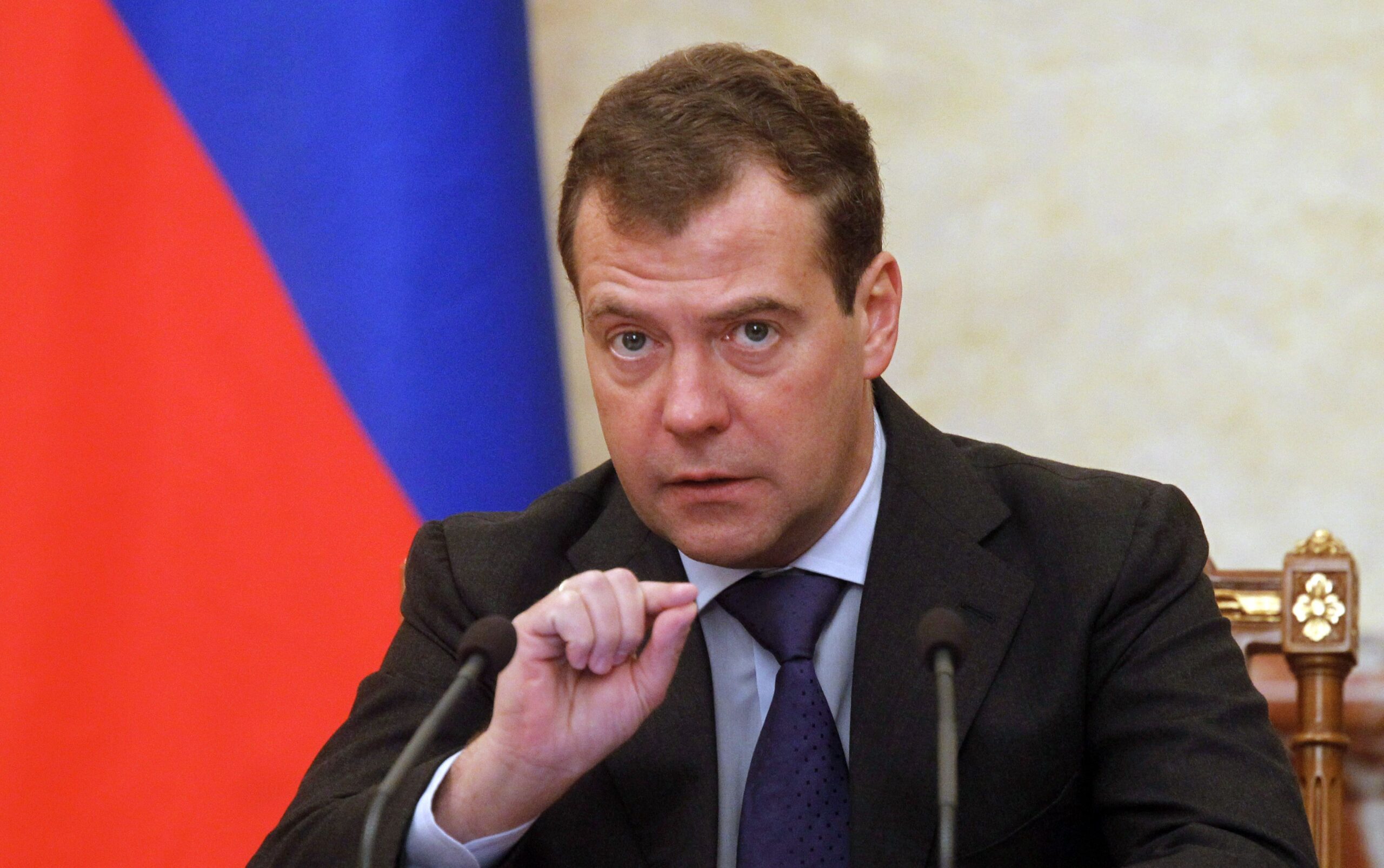




























 Yuri Gagarin, first man in space. (Photo courtesy:
Yuri Gagarin, first man in space. (Photo courtesy: 
















Why do i keep seeing iran in the list of the big four is always a mystery to me. as an Iranian i don't see any greatness in our technological and industrial capabilities. we may become powerful if we survive the current protests, regime change and the economic maelstrom of our own making.
OnePinguArmy on December 31, 2022 · at 11:37 am EST/EDT